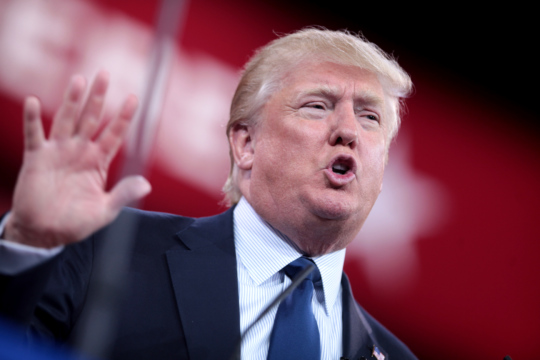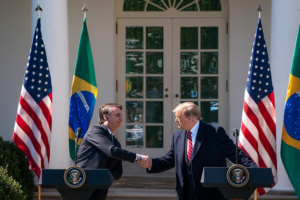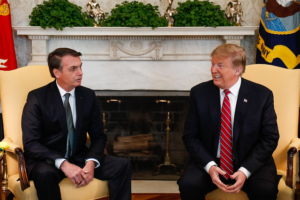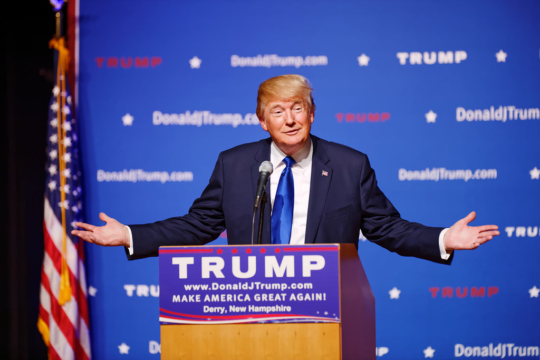
Surprises on the Road to the White House
For those who believed that Clinton and Bush would cruise to be the nominees for US president, this summer was full of surprises.
Last October, while the US government was still largely ignoring Brazil, Brazilian voters elected a new president, Jair Bolsonaro, who delights in being called the “Tropical Trump.” A former army captain and congressional back-bencher for 27 years, Bolsonaro was long considered a fringe politician in Brazil until he suddenly emerged as the likely winner of the election. He is a relentless nationalist who distrusts multilateral institutions and is deeply skeptical about globalization, enjoys a reputation as a tough, hardline champion of law and order, showers praise on Brazil’s 21- year long military dictatorship, and shows little respect for the rights of women, the LGBT community, and other minority groups.
Throughout his campaign, Bolsonaro regularly spoke of his high regard for President Trump’s leadership and pledged, once elected, to develop close economic, diplomatic, and security bonds with Washington—an objective which, even in much watered-down forms, had long eluded the two nations. His enthusiasm for aligning Brazil’s foreign policies with those of the White House was virtually uncontainable. He applauded US plans to withdraw from both the Iran nuclear deal and the Paris accords on climate change. Following the White House’s lead, he promised to move the Brazilian embassy in Israel to Jerusalem. He appointed a foreign minister who contended that the rising alarm pertaining to global warming was nothing more than a Marxist conspiracy, and he called for the liberation of Brazil from globalist ideology. Despite the vital role of Chinese trade and investment in Brazil’s economy, Bolsonaro has, on many occasions, expressed his objections to China’s expanding role and influence in Brazil—and he emphasized his disapproval by traveling to Taiwan shortly after his election. The new president also professed unflinching support for US policy in Venezuela and a willingness to join with Washington in considering “all options” (including presumably an armed intervention) to achieve regime change in the country. Although it was swiftly rejected by the nation’s military leaders, including many who now hold top government positions, Bolsonaro proposed that the US consider establishing a military base in Brazil.
The White House, in turn, responded favorably to Bolsonaro’s overtures. Trump had finally found a potential strongman ally to his liking in Latin America. Immediately after his electoral triumph was announced, the US president telephoned his congratulations, and agreed with Bolsonaro that the two nations should “stand side-by-side” as “regional leaders of the Americas.” In March of this year, Trump was the first head of state to host an official visit by Bolsonaro, breaking Brazil’s long tradition of sending its newly elected presidents to neighboring Argentina on their inaugural trip overseas. Top US foreign policy officials Secretary of State Mike Pompeo and National Security Advisor John Bolton generously praised Bolsonaro and warmly welcomed his lofty aspirations for relations with Washington. In a Time Magazine article Senator Marco Rubio, who today commands particular influence on inter-American affairs in Trump’s White House, proposed a series of concrete initiatives that a revitalized US-Brazilian partnership should pursue. Bolsonaro ended the visit by calling for the two nations to work jointly “to ensure liberties and respect to traditional family lifestyles, and respect to God…against gender ideology…and fake news.”
It is tempting to declare that, with Trump and Bolsonaro at the helm, the US and Brazil could well be on their way toward a new era in bilateral relations. But, for the time being, both nations should hold their expectations in check. Relations between the two nations, after all, have not been particularly constructive for more than a generation. And they have been downright cool and distant over the past half dozen years or so, especially since the revelation in 2013 of massive US spying on then President Dilma Rousseff and a number of Brazilian corporations. The discovery triggered her cancellation of a scheduled state visit to Washington, compounding the damage to bilateral ties from a severe US-Brazil confrontation just three years earlier over nuclear negotiations with Iran. This history over the past decade is hardly conducive to a radical shift in how the two countries deal with one another.

Although both nations have long professed an interest in upgrading their commercial ties, they have not come close to negotiating a single major economic pact for more than 30 years—while 11 other Latin American nations have signed onto ambitious free trade agreements with the US. For some time, Brazil has pursued its international interests and aspirations by standing apart from the United States. It has regularly emphasized its differences with Washington and has often resisted US initiatives in Latin America, including a hemisphere-wide free trade arrangement that was supported by most of the region’s governments. For its part, the US has seemed at times to consider Brazil a gadfly in world affairs, a nation that does not quite measure up to the status and power it claims it deserves. Although on the surface they are mostly amicable, US-Brazil relations have been marked by limited cooperation, considerable discord, and a few unpleasant clashes. Bolsonaro’s election and camaraderie with Trump just may not be enough to pave the way for more robust cooperation.
Few would question that both nations could benefit from improved, more productive bilateral ties. Brazil would stand to gain the most, particularly from increased commerce and investment. The United States is Brazil’s second largest commercial partner, after China. It accounts for some 12 to 15 percent of Brazil’s global trade and a considerably larger portion of its industrial exports. American banks and corporations are among the largest foreign investors in Brazil. The United States, on the other hand, relies on Brazil for a little more than two percent of its global trade.
Still, the US government and business community have long shown interest in more expansive economic relations with Latin America’s largest nation, and Brazil’s appeal was greatly enhanced by the confirmation some dozen years ago of huge, accessible petroleum reserves off the Brazilian coast. When he made his only visit to Brazil in 2011, President Obama brought along more than 50 CEOs of the US’s largest industries and emphasized economic opportunity as the purpose behind his trip. Hardly anyone today opposes the idea of bolstering US-Brazil economic ties, but neither country has yet been willing to undertake the major shift in the policies and priorities that would be necessary. Brazil will require a wide-ranging overhaul of trade and broader economic policies, much of which is included in the agenda of Bolsonaro’s Economy Minister Paulo Guedes. The US would, in turn, have to sharply modify many of its longstanding, politically sensitive protectionist measures, principally those affecting agriculture products. But none of this can happen very quickly, if at all.
To be sure, just the prospects of a stronger bilateral relationship with the US could generate some immediate benefits for Brazil. The expectation of stronger trade and diplomatic ties with the United States would offer a measure of reassurance to Brazil’s business community and its foreign investors about the country’s economic future. The beginnings of a more productive commercial engagement between the two nations could potentially help attract badly needed investments by easing concerns about the current weakness and volatility of the Brazilian economy.
Most other short-term benefits that might accrue to Brazil, however, are likely to be more symbolic than substantive. The Trump administration has already designated Brazil as a non-NATO ally, which should facilitate access to US military technology, training, and hardware. But these gains will be modest, as Argentina can attest having attained similar status some 25 years ago. Washington has also endorsed Brazil’s entry into the Organization of Economic Cooperation and Development (OECD), the exclusive club of the world’s wealthiest nations, mostly in North America, Europe, and Asia. Formal membership, however, requires for Brazil to adopt several critical economic reforms (and give up its developing nation advantages in international trade). For Brazil, OECD participation would be a welcome recognition of its economic potential and may carry some weight with investors, although they will surely be more attentive to the substance and quality of the country’s reform efforts.
In the end, Brazil’s regional and international stature will mostly hinge on its ability to effectively confront the massive economic, social, public security and corruption challenges on its domestic front—and not on the strength or nature of its bilateral ties with the US.
For its part, Washington has good reasons to pursue greater cooperation with Brazil. Today, Washington’s most urgent priority in hemispheric affairs is bringing an end to Maduro’s rule in Venezuela, followed by securing political change in Cuba and Nicaragua. Today, no other Latin American nation appears more committed than Brazil to the US goal of regime change in the three countries, dubbed the “Troika of Tyranny” by US National Security Advisor Bolton. With Brazil firmly on its side, Washington would have a considerably freer hand to tackle these regional challenges in accord with its own strategy and preferred course of action. Still, with its military decisively opposed to armed intervention in Venezuela and increasingly urging a negotiated solution, Brazil cannot be counted on to stand behind every US action.
The Trump administration seems intent as well on reviving the Monroe Doctrine and making it a keystone of US policy in Latin America (some half-a-dozen years after Secretary of State John Kerry declared it obsolete). The US wants to halt, even reverse, the expanding presence and influence of China in the hemisphere, along with other potential rivals like Russia and Iran. A few months ago, President Trump berated El Salvador and Panama for their recent decisions to sever relations with Taiwan and formally recognize China (similar to what the US decided back in 1978).
So far, however, Latin American governments, including Brazil, have largely disregarded the warnings from Washington about their extra-hemispheric ties. They may have become a bit more cautious in their relations with China but have left them mostly unaltered. Before taking office, President Bolsonaro had been a vocal critic of China’s unchecked and rapidly spreading influence in key sectors of the Brazilian economy. The White House was surely pleased by his calling China a predator and raising the alarm that “The Chinese are not buying in Brazil. They are buying Brazil.” More recently, however, Bolsonaro has not said much about China’s commercial practices in Brazil. Six months ago, the Brazilian president snubbed China by traveling to Taiwan. He now has a visit planned to China—where his vice-president recently spent a week preparing the way. Bolsonaro appears finally to be paying attention to the potentially huge costs, political as well as economic, of restricting Chinese activities in Brazil. His core political coalition—banking and corporate leaders, powerful agribusiness groups and other commodity producers, and military officials—are, understandably, firmly opposed to almost any restraints on business and financial relations with China.
It should not be surprising that advocates for expanding Brazil’s commercial ties with China are also among the strongest supporters of intensifying economic engagement with the United States. Brazil’s powerful economic minister, Paulo Guedes, has emphasized over and over that growing financial and commercial relations with both the US and China are possible and desirable—and, indeed, together should be top policy priorities for Brazil. Whether it uses persuasion, pressure, or threats, the United States is unlikely, in the foreseeable future, to slow or reverse rising Chinese trade and investment in Brazil—or elsewhere in Latin America.
Brazil’s relationship with China illuminates many of the obstacles and contradictions facing the Bolsonaro government’s international and domestic policy aims. Brazil’s economic recovery and sustained growth require a pragmatic, interest-driven agenda to expand exports, attract new investment from abroad, and restore business and consumer confidence domestically. Yet the government is also pressing forward with a highly conflictive, ideological agenda that is often incompatible with the needs of its economy.
The proposed relocation of Brazil’s embassy in Israel to Jerusalem, for instance, was resisted by Brazilian agricultural producers who feared it would spend $8 billion in exports to the Middle East. It was also opposed by military leaders who feared provoking jihadist terror attacks in Brazil. Similarly, the Brazilian president retreated from his pledge to withdraw from the Paris climate change accords, an action which threatened cutbacks of Brazil’s exports to several European nations, and potentially put at risk already long-delayed negotiations for an EU-Mercosur trade pact. Brazil’s agribusiness interests, a solid source of support for the Bolsonaro government, face their own contradictions. They are eager for expanded markets in Europe and elsewhere. But their eagerness to see a substantial rollback of many of Brazil’s environmental regulations is troubling for many of the country’s international partners (although not the US government).

The inconsistencies in Brazil’s international policies recently led to Bolsonaro calling off a visit to New York City, where he was to be honored as “Person of the Year” by the US-Brazil Chamber of Commerce at a dinner sponsored by many of the America’s leading banks and large corporations. Once it was made public, the celebration was greeted by a series of protests and editorials censuring the Brazilian president as a climate change denier and indifferent to ecological destruction and abuses of human rights. The Mayor of New York jumped with his own scathing criticism of Bolsonaro. The city’s distinguished Museum of Natural History felt the heat and canceled the dinner and ceremony, which was later held in Dallas, while several US corporations withdrew their support. The lesson is clear. Brazil may end up paying a painfully high price for the government’s incendiary rhetoric and its pursuit of extreme policies, at home or abroad.
Brazil and the United States might yet find ways to work together effectively in the coming period on such challenges as Venezuela’s deepening crisis and Brazil’s economic hurdles—although the two nations have not shown much progress in that direction in the five months since Bolsonaro took office. Chaotic politics, a floundering economy, and multiple other domestic stumbling blocks have severely constrained Brazil’s capacity to develop and sustain a coherent approach to its bilateral relations with the United States and international affairs in general. Political and financial reality has forced the Bolsonaro government to abandon or backpedal on many of its initial foreign policy declarations, including a variety of its assurances to Washington.
One more caution. Even if the Bolsonaro government were in a position to pull out all stops in pursuit of an intensive engagement with the United States, it should not be taken for granted that Washington would be a reliable ally. Over the past two and a half years, the Trump administration has shown how readily and how dramatically the winds of US policy can shift direction. On this score, US policies toward Mexico offer a stunning example. After nearly two years of complex, politically sensitive negotiations, the United States and Mexico (and Canada) celebrated the signing of a revised NAFTA agreement, which was followed by the lifting US tariffs on Mexican steel and aluminum. A week later, however, the White House threatened to impose new taxes on all Mexican imports unless Mexico once again bowed to its demands, this time on migration.
Significant amounts of the Obama era foreign policy agenda, in Latin America and worldwide, has been overhauled or discarded—and the revisions and reversals continue. The president and his top advisors continue to vilify and browbeat America’s closest allies and largest economic partners—including Canada, Britain, Germany, and Japan, in addition to Mexico. With a historically far weaker relationship than any one of these countries, Brazil needs to be especially cautious in what it promises and what it expects from the United States under the Trump administration.
It is hard to imagine exactly what kind of deal Bolsonaro and Trump, both anomalous, unconventional leaders, drawn to one another mainly by temperament and ideology, could strike with another. Could they really end up accomplishing what previous governments in both countries had failed to achieve? Could they forge an alliance between two countries that have long maintained a rather distant and often distrustful relationship? The chasm between the US and Brazil cannot be easily bridged. While they certainly overlap, the interests and goals of the two countries are far from identical, and they have often clashed. Even when their interests have been compatible, the two governments have not managed to align their policies. Brazil has a well-established reputation for operating independently and often saying no to Washington. To stand side-by-side with the United States, Brazil would need to remake the style and content of its international policies. Today, when its domestic situation is so troubling and precarious, a new and strikingly ambitious foreign agenda is probably out of reach.
For those who believed that Clinton and Bush would cruise to be the nominees for US president, this summer was full of surprises.
For anyone still wondering how Donald Trump came to be the Republican Party’s nominee for president of the United States, his surprise visit to Mexico on Wednesday for a meeting with President Enrique Peña Nieto offered some clues.
With a constant stream of offensive and intimidating rhetoric addressed to Mexico, compounded by a mean-spirited and highly contentious set of policy proposals, Trump himself is largely responsible for the sharp deterioration in bilateral ties in the past two years.

